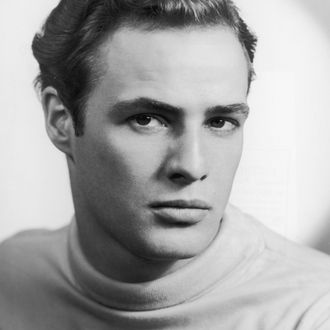
This post originally ran January 2015. We are rerunning it with Listen to Me Marlon out this weekend.
Marlon Brando died more than a decade ago. And Marlon Brando when he was alive wasn’t known for being particularly open; indeed, for much of his life, he was considered fairly reclusive. And yet here he is, in the fascinating documentary Listen to Me Marlon, taking us on a journey into his life and his deepest, most intimate thoughts. The film, which premiered at Sundance this week, was produced and developed by Showtime and will premiere on the network later this year. It turns out that Brando — starting in the 1940s and right through to his later years — had been creating private audio recordings in which he discussed his life. “Probably about 300 hours of it,” says director Stevan Riley. “When we finally got it all transcribed, we had a pile of paper about four feet off the ground.” Using those recordings, and supplementing them with clips from interviews and other appearances, Riley was able to construct Listen to Me Marlon as a film narrated by Brando. The result is unusually eerie — a trip inside the head of one of the most elusive and unusual stars in Hollywood history.
When Riley was approached about doing a documentary on Brando’s life, he says that he had the idea of telling the story through Brando’s own words — but almost as a pipe-dream. “I knew this stuff existed, but I didn’t know how much,” he confesses. Almost nobody did. “Marlon actually kept all this stuff in a bunker outside of his house. He didn’t keep any memorabilia at home, but it was all out there. There was also loads of written material to go with the audio and visual material. It’s amazing, because he was so private and so rarely did interviews.” It also turned out that the star was really into technology. “There were drawers full of tape recorders,” Riley says. “He was interested in CB radio, ham radio … There were whole tapes of microphone tests.”
There was, of course, a certain confessional quality to Brando’s performances. Even in his shining early years, his onscreen charisma came partly from our sense that there were real emotional wounds there — that when Brando acted, he was revealing something about himself rather than hiding it. That all came to a head, of course, in Bernardo Bertolucci’s Last Tango in Paris (1972), in which Brando improvised intimate, haunting monologues about his life.
Maybe that’s why, despite his publicity-shy nature, Brando was, in his own private way, so open to those tape recorders — it was just him and a machine, without the intermediary of directors or reporters or anyone else, really. A certain amount of paranoia didn’t hurt, either. “He had mikes placed around the house so he could eavesdrop on others,” notes Riley. “He was also worried about whether he was being monitored by the CIA during his years of activism on behalf of Indian causes.”
Listen to Me Marlon features Brando talking about everything from his very early years, through the many highs and lows of his career, his changing thoughts on acting, as well as his personal life — his marriages, his son Christian’s conviction for murder, even his daughter Cheyenne’s tragic suicide. It’s not heavy on facts, though — the film really does unfold as an emotional journey through Brando’s thoughts rather than a hard-nosed, factual account of his eventful life. “I wanted it to have a stream-of-consciousness quality,” says Riley. “I wanted it to be an experience where you’re carried along rather than just receiving facts. I wanted this to be Marlon sharing his life.”


